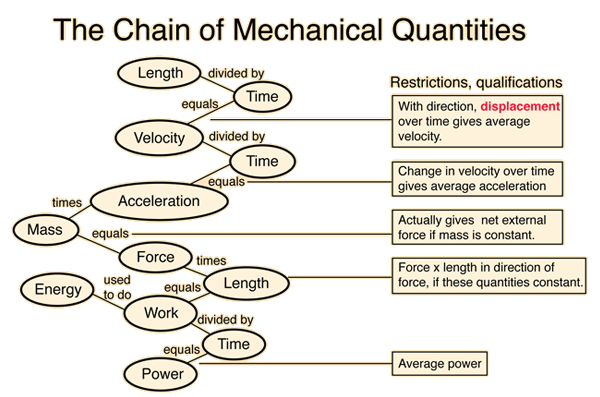
Monday, September 28, 2015
Ch 11: Sound Waves 2
Doppler Effect - the apparent change in the pitch
or frequency of a sound when there is relative motion between the source &
the observer


Tuesday, September 15, 2015
Tuesday, September 1, 2015
Tuesday, July 28, 2015
Monday, July 27, 2015
Saturday, July 25, 2015
Wednesday, July 1, 2015
Forces 3
4. Object on an incline plane
4.1. Object on incline plane experiences 3 forces: Normal force (N), gravitational force (W) and friction (f)
4.1. Object on incline plane experiences 3 forces: Normal force (N), gravitational force (W) and friction (f)
4.2 FBD
4.3 Transform
4.4 Forces in equilibrium
SFnett = 0 Þ SFx
= 0
Þ SFy = 0
Tuesday, June 30, 2015
Forces 2
3. Newton's Law
3.1 Newton's 1st Law is about object in equilibrium
- Object at rest will stay at rest, or continue to move with constant velocity in a straight line unless it is acted upon by an external force
Forces 1
1. Type of forces
2. FBD, example 1
- Below is a flying jet
- Label all the forces that act on it
- Draw FBD
Friday, June 19, 2015
Momentum & Impulse 2
3.2 Conservation of
linear momentum
1. States
- “In an isolated (closed) system, the total momentum of that system is constant.”
OR
- “When the net external force on a system is zero, the total momentum of that system is constant.”, Sp = constant,
OR
- The total of initial momentum = the total of final momentum
Wednesday, June 17, 2015
Momentum & Impulse 1
3.1 Momentum
& impulse
1.
Impulse, J = FDt
2.
Change in momentum: Dp = m (v2 – v1)
3.
Impulse-Momentum Theorem
The impulse of
the force F acting on a particle equals
the change in the momentum of the particle caused by that force
J =
FDt = m(v2 – v1)
Monday, June 1, 2015
Basic VS Derived quantities
Basic quantity
Derived quantity - Combination of badic quantities
http://physics.nist.gov/cuu/Units/units.html

| |||||||||||||||||||||||||||
Derived quantity - Combination of badic quantities
Other Units
| |
velocity
|
meter per second, m/s
|
acceleration
|
meter per second squared,
|
force
|
Newton,
|
pressure
|
Pascal,
|
energy
|
Joule,
 |
power
|
Watt,
 |
http://physics.nist.gov/cuu/Units/units.html

Sunday, May 31, 2015
SF016_Physics for Matriculation KPM
Syllabus for SF016 2015/ 2016
1.
PHYSICAL QUANTITIES AND
MEASUREMENTS (3 HOURS)
1.0 Physical
Quantities & Units
1.1 Scalars
& Vectors
2.
KINEMATICS OF LINEAR MOTION
(5 HOURS)
2.1 Linear
Motion
2.2 Uniformly
Accelerated Motion
2.3 Free
Falling Body
2.4 Projectile
Motion
3.
MOMENTUM AND IMPULSE (2
HOURS)
3.1 Momentum
& Impulse
3.2 Conservation
of Linear Momentum
4.
FORCES (5 HOURS)
4.1
Basic of Forces & Free Body Diagram
4.2
Newton's Laws of Motion
5.
WORK, ENERGY AND POWER (3
HOURS)
5.1
Work
5.2
Energy & Conservation of Energy
5.3
Power & Mechanical Efficiency
6.
CIRCULAR MOTION (3 HOURS)
6.1
Uniform Circular Motion
6.2
Centripetal Force
7.
GRAVITATION (2 HOURS)
7.1
Gravitational Force & Field Strength
7.2
Gravitational Potential
7.3
Satellite Motion In a Circular Orbit
8.
ROTATION OF A RIGID BODY (8
HOURS)
8.1
Equilibrium of a Uniform Rigid Body
8.2
Equilibrium of a Uniform Rigid Body
8.3
Rotational Kinematics
8.4
Rotational Dynamics
8.5
Work And Energy of Rotational Motion
8.6
Conservation of Angular Momentum
9.
SIMPLE HARMONIC MOTION ( 5
HOURS)
9.1
Simple Harmonic Motion (SHM)
9.2
Kinematics of SHM
9.3
Kinematics of SHM
9.4
Graphs of Simple Harmonic Motion
9.5
Period of SHM
10.
MECHANICAL WAVES ( 3 HOURS)
10.1
Properties of Waves
10.2
Superposition of Waves
11.
SOUND WAVE (4 HOURS)
11.1
Intensity & Beats
11.2
Applications of Stationary Waves
11.3
Doppler Effect
12.
DEFORMATION OF SOLIDS (2
HOURS)
12.1
Stress and Strain
12.2
Young’s modulus
13.
HEAT (2 HOURS)
13.1
Thermal Conduction
13.2
Thermal Expansion
14.
KINETIC THEORY OF GASSES (3
HOURS)
14.1
Ideal Gas equations
14.2
Kinetic Theory of Gasses
14.3
Molecular Kinetic Energy & Internal Energy
15.
THERMODYNAMICS (4 HOURS)
15.1
First Law Of Thermodynamics
15.2
Thermodynamic Processes
15.3
Thermodynamics Work


Subscribe to:
Comments (Atom)































